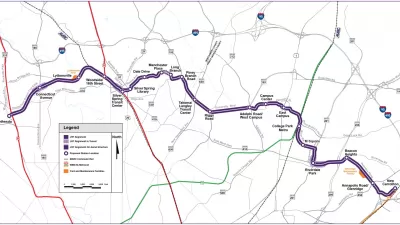A new study indicates that one of America's poster children for auto-centric development has a made a significant u-turn. Since 2009, the majority of Atlanta's new commercial and rental housing has been built in "walkable urban places".
"Since 2009, 60 percent of new office, retail and rental properties in Atlanta have been built in what Christopher Leinberger calls 'walkable urban places' – those neighborhoods already blessed by high Walk Scores or on their way there," reports Emily Badger. "That new construction has taken place on less than 1 percent of the metropolitan Atlanta region's land mass, suggesting a shift in real estate patterns from expansion at the city's edges to denser development within its existing borders."
"'This is indicative that we’re seeing the end of sprawl,' says Leinberger, a research professor with the George Washington University School of Business, who led the study in conjunction with Georgia Tech and the Atlanta Regional Commission."
FULL STORY: Have We Reached Peak Sprawl?

Maui's Vacation Rental Debate Turns Ugly
Verbal attacks, misinformation campaigns and fistfights plague a high-stakes debate to convert thousands of vacation rentals into long-term housing.

Planetizen Federal Action Tracker
A weekly monitor of how Trump’s orders and actions are impacting planners and planning in America.

In Urban Planning, AI Prompting Could be the New Design Thinking
Creativity has long been key to great urban design. What if we see AI as our new creative partner?

Portland Raises Parking Fees to Pay for Street Maintenance
The city is struggling to bridge a massive budget gap at the Bureau of Transportation, which largely depleted its reserves during the Civd-19 pandemic.

Spokane Mayor Introduces Housing Reforms Package
Mayor Lisa Brown’s proposals include deferring or waiving some development fees to encourage more affordable housing development.

Houston Mayor Kills Another Bike Lane
The mayor rejected a proposed bike lane in the Montrose district in keeping with his pledge to maintain car lanes.
Urban Design for Planners 1: Software Tools
This six-course series explores essential urban design concepts using open source software and equips planners with the tools they need to participate fully in the urban design process.
Planning for Universal Design
Learn the tools for implementing Universal Design in planning regulations.
Gallatin County Department of Planning & Community Development
Heyer Gruel & Associates PA
JM Goldson LLC
City of Camden Redevelopment Agency
City of Astoria
Transportation Research & Education Center (TREC) at Portland State University
Jefferson Parish Government
Camden Redevelopment Agency
City of Claremont





























